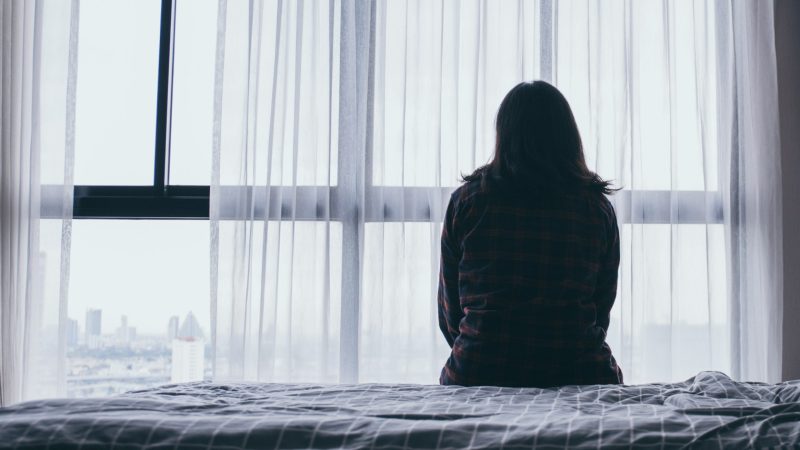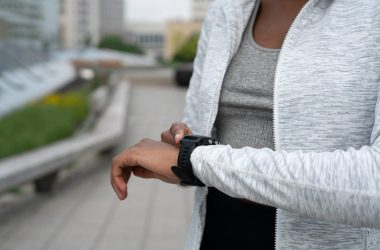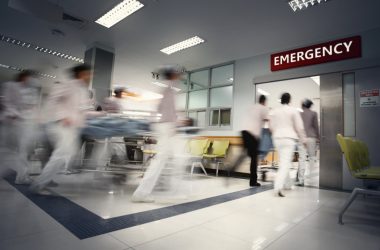Health
Rapid relief for the severely depressed? There’s a catch.
Ketamine carries risks, say researchers. Yet for some patients, it’s ‘the only thing that works.’
At the Ketamine Clinic for Depression at Massachusetts General Hospital, patients make their way each day to receive intravenous infusions of the powerful anesthetic that has become an alternative therapy for treatment-resistant depression.
Many of the clinic’s patients have not been helped by traditional treatments, including psychological counseling, antidepressant medication, transcranial magnetic stimulation, and electroconvulsive therapy. With its rapid antidepressant effects, ketamine is sometimes the only option that provides relief, said clinic founder and director Cristina Cusin, who has been researching depression and mood disorders for the past 25 years.
“We don’t have good weapons to treat some severe forms of depression, just like we don’t have treatments for advanced-stage cancer,” said Cusin, who is also an associate professor in psychiatry at Harvard Medical School. “We’re always looking for the next thing so that we can continue to offer hope to patients who don’t respond to standard treatments.”
In 2000, after a study reported that small doses of IV ketamine rapidly reversed symptoms of depression while standard antidepressants often took several weeks to have an effect, ketamine became the next new thing. In 2019, based on years of research, the FDA approved a nasal spray medication, derived from ketamine, to be administered under medical supervision.
Depression is a mental health disorder characterized by feelings of sadness and hopelessness, that affects 18 percent of Americans. One-third of those diagnosed with depression don’t respond to standard treatments, with acute consequences to their personal and professional lives. The stigma associated with depression makes it harder for people to seek treatment, said Cusin.
“There are some forms of depression that have a strong biological component; there are neurocircuits in the brain that are not functioning right. In many cases, it’s not for lack of trying.”
Cristina Cusin
“In our society, if you suffer from depression, you may be told to ‘try harder,’ ‘stop complaining,’ ‘pick yourself up by your bootstraps,’ and so on,” Cusin said. “But there are some forms of depression that have a strong biological component; there are neurocircuits in the brain that are not functioning right. In many cases, it’s not for lack of trying.”
Patients follow a strict protocol to be admitted to the MGH Ketamine Clinic; not only do they have to be referred by their primary prescribers, but also prior treatments for depression must have failed. Ketamine therapy is integrated with other treatments and is done in the clinic under medical supervision and in coordination with patients’ primary medical teams. The clinic doesn’t admit self-referred patients or those with active substance use disorders or a history of psychosis. Ketamine produces hallucinogenic effects and dissociation, which can exacerbate psychotic symptoms.
Other risks associated with ketamine are the possibility of developing addiction and a host of medical problems, but for patients who experience rapid relief from their symptoms of depression after treatment, ketamine is a game-changer, said Cusin. “Our patients have failed other treatments, so they don’t have a lot of other options,” she said. “If this is the only thing that works, they keep coming.”
Scientists continue researching ketamine’s antidepressant effects on treatment-resistant depression. A recent clinical trial found that ketamine was as effective for non-psychotic treatment-resistant depression as electroconvulsive therapy (ECT), which has long been the gold standard for hard-to-treat depression.
Conducted by Amit Anand, professor of psychiatry at Harvard Medical School, the study found that 55 percent of those receiving ketamine and 41 percent of those receiving ECT had at least a 50 percent improvement in their self-reported depression symptoms. Anand co-authored the pivotal 2000 study that revealed the rapid antidepressant effects of ketamine.
Encouraged by his recent study’s results, Anand is conducting a follow-up clinical trial comparing ketamine and ECT treatments among patients with suicidal depression. If ketamine can affect suicidal thoughts, it could be lifesaving. “What we’re trying to see is that if ketamine can cause a very rapid reversal of the troubling kind of depression leading to suicidality,” he said. “People are suffering, and even if it is for a short time, it is beneficial to provide a rapid change.”
“What we’re trying to see is that if ketamine can cause a very rapid reversal of the troubling kind of depression leading to suicidality.”
Amit Anand
Even though doctors and researchers are hopeful regarding the promise of ketamine, there is growing concern about the proliferation of private ketamine clinics, which began to crop up around the country after restrictions on telemedicine relaxed during the pandemic. These clinics offer IV ketamine infusions, with prices ranging from $600 to $800 per infusion.
Most ketamine private clinics operate in a gray zone, with almost no oversight, and function as for-profit businesses, said Peter Grinspoon, a primary care physician, educator, and cannabis specialist at MGH.
“The end result is that now our population has broad access to ketamine, and it’s a little bit of an uncontrolled experiment,” said Grinspoon. “Whether it’s going to alleviate many people’s depression or whether it’s going to get a lot of people addicted to ketamine is going to be an open question. We don’t know how much it is going to help or harm things.”
Ketamine is not nearly as addictive as alcohol or opioids, but its use as a recreational drug poses serious risks. Actor Matthew Perry died last year of “acute effects of ketamine.” His autopsy also found opioids in his blood, but the level of ketamine found was equivalent to the amount that would be used during general anesthesia.
The other troubling issue for Grinspoon is affordability. “I work as a primary care doctor in an inner-city clinic,” he said. “None of my patients can afford six $800 injections. … The last thing we need is for ketamine to be another treatment for just the well to-do. … This has got to be affordable.”
At the MGH clinic, patients receive low doses of ketamine in long intervals and have mixed experiences. While some report feeling relaxed, others find it unpleasant, but most said their symptoms of depression improve and don’t interfere with day-to-day functioning. Still,
Cusin warns that ketamine should not be a first-option treatment for depression.
“If someone is depressed or suicidal, there are alternatives out there,” said Cusin. “There are 50, 80 different treatments to consider. It’s rare that somebody has tried everything. Usually, there are entire classes of medications or treatments that have not been considered. There is always hope.”





